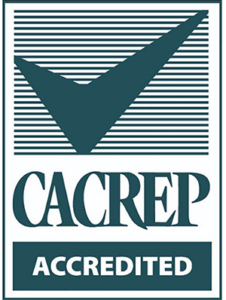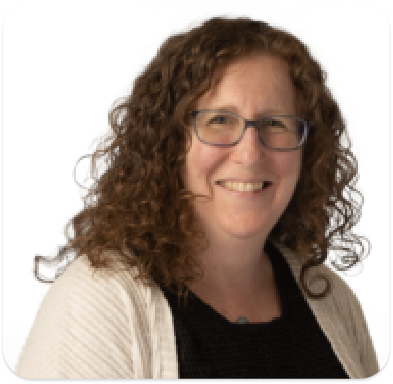Compassionate, Holistic Counseling
Do you want to put your compassion to work facilitating the healing journeys of others? To learn to do this effectively, we offer a training program that aligns with national training standards for the master’s in counseling program.
 Saybrook’s hybrid online M.A. in Counseling: Clinical Mental Health Counseling Specialization program is accredited by the Council for Accreditation of Counseling and Related Educational Programs (CACREP). CACREP accreditation ensures that the content and quality of our program have been evaluated and meet standards set by the profession. As a graduate from our CACREP-accredited online clinical mental health counseling programs, you will be equipped with the skills and knowledge for competent practice.
Saybrook’s hybrid online M.A. in Counseling: Clinical Mental Health Counseling Specialization program is accredited by the Council for Accreditation of Counseling and Related Educational Programs (CACREP). CACREP accreditation ensures that the content and quality of our program have been evaluated and meet standards set by the profession. As a graduate from our CACREP-accredited online clinical mental health counseling programs, you will be equipped with the skills and knowledge for competent practice.
Through a hybrid-online learning format that includes 700 hours of field experience, our M.A. in Counseling: Clinical Mental Health Counseling Specialization program will prepare you for career opportunities in the broad field of clinical mental health counseling. Guided by faculty with years of experience in the field, you can complete the M.A. in Counseling program without relocating. In this low-residency program, you will become part of a cohort, interacting online and meeting at the beginning of each semester while attending Residential Learning Experiences.
The Counseling Department has adopted a set of professional and personal qualities all students and faculty are expected to demonstrate. These qualities are directly linked to the mission and core values of Saybrook University and inform the related program objectives. The program learning outcomes were born directly out of the department’s core values. All members of the counseling community are expected to embody these qualities inside and outside of courses to the greatest extent possible. Upon completion of the counseling programs, students will demonstrate the associated learning outcomes.
Learn more about our M.A. in Counseling program outcomes by reviewing our Student Handbook or Annual Assessment Reports:
- 2021-2022 Annual Assessment Report
- 2022-2023 Annual Assessment Report
- 2023-2024 Annual Assessment Report
As a graduate from this program, you will have satisfied course requirements to apply for licensure as a Licensed Professional Counselor (LPC), Licensed Professional Clinical Counselor (LPCC), or Licensed Mental Health Counselor (LMHC). Different states have different licensing requirements, and we will work with you from the very beginning to help you qualify for licensure in the state where you wish to practice. Learn more about the program’s alignment with state professional licensure requirements.
Annual Program Related Student Outcomes
The Counseling Department is pleased to share the following student outcomes, to both meet ongoing CACREP requirements, and to share the success of our graduates. 2023-2024 (summer 2023, fall 2023, spring 2024)
- 100% of graduates who took the exam in this window passed the exam on the first attempt (5 out of 5)
- 0% of graduates did not pass the exam on first attempt (0 out of 4)
Number of graduates:
- 39 students graduated during the 2023-2024 academic year, representing a 76% completion rate.
Job Placement Rates: This data is based on a 42% response rate to the survey. Six out of 14 students responded to the most recent survey (summer 2022). Data will be collected again in fall 2024.
- 82% are employed within the mental health field
- 16% are currently seeking a position
Other Counseling Programs
Interested in advancing toward a counseling doctoral program? We offer an additional counseling program that may align more closely with your goals.
Clinical Mental Health Counseling Specialization Job Outcomes
Upon graduation, you will have the skill set to work in a variety of roles in private practice, nonprofit service centers, substance recovery centers, community health centers, and beyond, including:
- Mental health counselor
- Counseling program coordinator
- Crisis intervention counselor
- School counselor
- Substance abuse counselor
- Rehabilitation counselor
Connect with Us
Saybrook Learning Model
Online learning fueled by community and connection defines the Saybrook experience. As pioneers of the virtual classroom, we understand there is no substitute for the joy, belonging, and exploration that occurs when we collaborate as a community. The University Learning Experiences were designed to foster this collaboration and connection regularly.
- Residential Learning Experiences (RLE)
At these in-person intensives, clinical program students put theory into practice, hone clinical skills, gain professional guidance from experienced faculty, and acquire the residential hours required for clinical licensure. - Virtual Learning Experience (VLE)
Explore, collaborate, and deepen your engagement with your learning community. These online, synchronous events foster rich interactions beyond the classroom with your classmates and faculty. - Community Learning Experience (CLE)
Form meaningful connections, explore new ideas and perspectives, and immerse yourself in a transformative experience during this in-person, five-day event with the entire Saybrook University community.

Faculty
Saybrook’s Counseling faculty are practitioner-scholars dedicated to advancing their field through continued practice and comprehensive instruction. Meet some of our faculty members below.

Jennifer Preston, Ph.D., NCC, LPC
- Program Director, Saybrook University
- Former Master’s and Doctorate Professor, Minnesota State University
- Active Member, American Counseling Association and Association for Counselor Education and Supervision